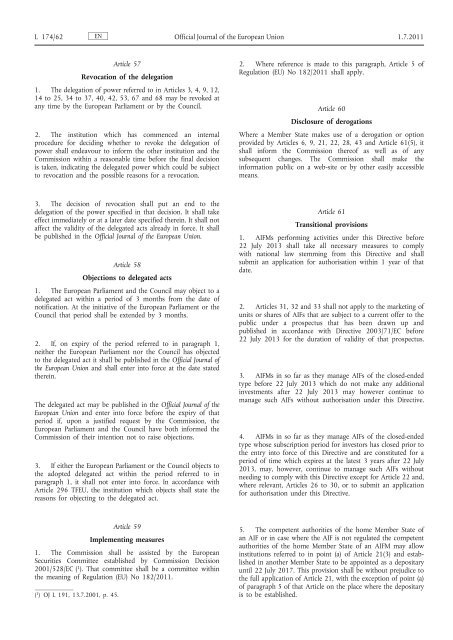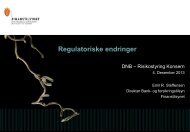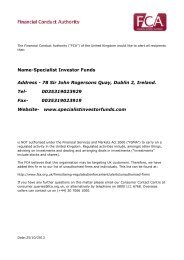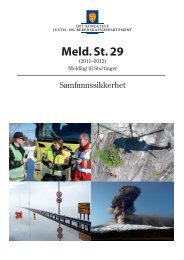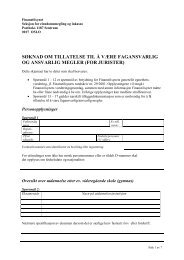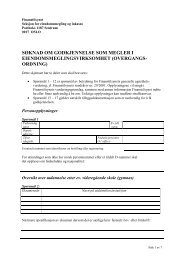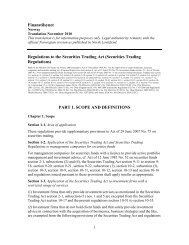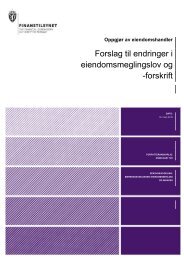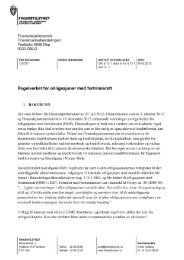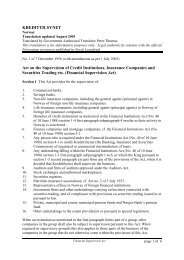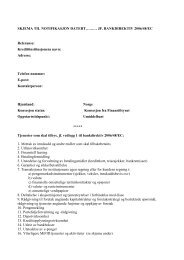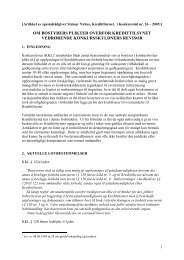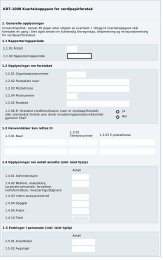Rapport om gjennomføring av AIFMD i norsk rett - Finanstilsynet
Rapport om gjennomføring av AIFMD i norsk rett - Finanstilsynet
Rapport om gjennomføring av AIFMD i norsk rett - Finanstilsynet
You also want an ePaper? Increase the reach of your titles
YUMPU automatically turns print PDFs into web optimized ePapers that Google loves.
EN<br />
L 174/62 Official Journal of the European Union 1.7.2011<br />
Article 57<br />
Revocation of the delegation<br />
1. The delegation of power referred to in Articles 3, 4, 9, 12,<br />
14 to 25, 34 to 37, 40, 42, 53, 67 and 68 may be revoked at<br />
any time by the European Parliament or by the Council.<br />
2. The institution which has c<strong>om</strong>menced an internal<br />
procedure for deciding whether to revoke the delegation of<br />
power shall ende<strong>av</strong>our to inform the other institution and the<br />
C<strong>om</strong>mission within a reasonable time before the final decision<br />
is taken, indicating the delegated power which could be subject<br />
to revocation and the possible reasons for a revocation.<br />
3. The decision of revocation shall put an end to the<br />
delegation of the power specified in that decision. It shall take<br />
effect immediately or at a later date specified therein. It shall not<br />
affect the validity of the delegated acts already in force. It shall<br />
be published in the Official Journal of the European Union.<br />
Article 58<br />
Objections to delegated acts<br />
1. The European Parliament and the Council may object to a<br />
delegated act within a period of 3 months fr<strong>om</strong> the date of<br />
notification. At the initiative of the European Parliament or the<br />
Council that period shall be extended by 3 months.<br />
2. If, on expiry of the period referred to in paragraph 1,<br />
neither the European Parliament nor the Council has objected<br />
to the delegated act it shall be published in the Official Journal of<br />
the European Union and shall enter into force at the date stated<br />
therein.<br />
The delegated act may be published in the Official Journal of the<br />
European Union and enter into force before the expiry of that<br />
period if, upon a justified request by the C<strong>om</strong>mission, the<br />
European Parliament and the Council h<strong>av</strong>e both informed the<br />
C<strong>om</strong>mission of their intention not to raise objections.<br />
3. If either the European Parliament or the Council objects to<br />
the adopted delegated act within the period referred to in<br />
paragraph 1, it shall not enter into force. In accordance with<br />
Article 296 TFEU, the institution which objects shall state the<br />
reasons for objecting to the delegated act.<br />
Article 59<br />
Implementing measures<br />
1. The C<strong>om</strong>mission shall be assisted by the European<br />
Securities C<strong>om</strong>mittee established by C<strong>om</strong>mission Decision<br />
2001/528/EC ( 1 ). That c<strong>om</strong>mittee shall be a c<strong>om</strong>mittee within<br />
the meaning of Regulation (EU) No 182/2011.<br />
( 1 ) OJ L 191, 13.7.2001, p. 45.<br />
2. Where reference is made to this paragraph, Article 5 of<br />
Regulation (EU) No 182/2011 shall apply.<br />
Article 60<br />
Disclosure of derogations<br />
Where a Member State makes use of a derogation or option<br />
provided by Articles 6, 9, 21, 22, 28, 43 and Article 61(5), it<br />
shall inform the C<strong>om</strong>mission thereof as well as of any<br />
subsequent changes. The C<strong>om</strong>mission shall make the<br />
information public on a web-site or by other easily accessible<br />
means.<br />
Article 61<br />
Transitional provisions<br />
1. AIFMs performing activities under this Directive before<br />
22 July 2013 shall take all necessary measures to c<strong>om</strong>ply<br />
with national law stemming fr<strong>om</strong> this Directive and shall<br />
submit an application for authorisation within 1 year of that<br />
date.<br />
2. Articles 31, 32 and 33 shall not apply to the marketing of<br />
units or shares of AIFs that are subject to a current offer to the<br />
public under a prospectus that has been drawn up and<br />
published in accordance with Directive 2003/71/EC before<br />
22 July 2013 for the duration of validity of that prospectus.<br />
3. AIFMs in so far as they manage AIFs of the closed-ended<br />
type before 22 July 2013 which do not make any additional<br />
investments after 22 July 2013 may however continue to<br />
manage such AIFs without authorisation under this Directive.<br />
4. AIFMs in so far as they manage AIFs of the closed-ended<br />
type whose subscription period for investors has closed prior to<br />
the entry into force of this Directive and are constituted for a<br />
period of time which expires at the latest 3 years after 22 July<br />
2013, may, however, continue to manage such AIFs without<br />
needing to c<strong>om</strong>ply with this Directive except for Article 22 and,<br />
where relevant, Articles 26 to 30, or to submit an application<br />
for authorisation under this Directive.<br />
5. The c<strong>om</strong>petent authorities of the h<strong>om</strong>e Member State of<br />
an AIF or in case where the AIF is not regulated the c<strong>om</strong>petent<br />
authorities of the h<strong>om</strong>e Member State of an AIFM may allow<br />
institutions referred to in point (a) of Article 21(3) and established<br />
in another Member State to be appointed as a depositary<br />
until 22 July 2017. This provision shall be without prejudice to<br />
the full application of Article 21, with the exception of point (a)<br />
of paragraph 5 of that Article on the place where the depositary<br />
is to be established.


